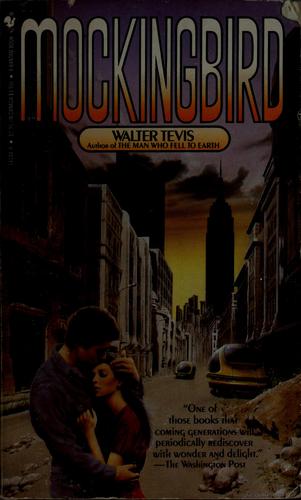Paperback, 276 pages
English language
Published Nov. 10, 1981 by Bantam.

Paperback, 276 pages
English language
Published Nov. 10, 1981 by Bantam.
In a world where the human population has suffered devastating losses, a handful of survivors cling to what passes for life in a post-apocalyptic, dying landscape. A world where humans wander, drugged and lulled by electronic bliss. A dying world of no children and no art, where reading is forbidden. And a strange love triangle: Spofforth, who runs the world, the most perfect machine ever created, whose only wish is to die; and Paul and Mary Lou, a man and a woman whose passion for each other is the only hope for the future of human beings on earth.
An elegiac dystopia of mankind coming to terms with its own imminent extinction, Mockingbird was nominated for a Nebula Award for Best Novel.
In the 25th century all the work is done by robots, the ones that haven't broken down. Mankind stumbles along in a drugged stupor, trained from …
In a world where the human population has suffered devastating losses, a handful of survivors cling to what passes for life in a post-apocalyptic, dying landscape. A world where humans wander, drugged and lulled by electronic bliss. A dying world of no children and no art, where reading is forbidden. And a strange love triangle: Spofforth, who runs the world, the most perfect machine ever created, whose only wish is to die; and Paul and Mary Lou, a man and a woman whose passion for each other is the only hope for the future of human beings on earth.
An elegiac dystopia of mankind coming to terms with its own imminent extinction, Mockingbird was nominated for a Nebula Award for Best Novel.
In the 25th century all the work is done by robots, the ones that haven't broken down. Mankind stumbles along in a drugged stupor, trained from birth to avoid thinking and that "privacy is supreme. They haven't the basic knowledge to repair anything, much less a complex machine.
One of the last of the great thinking robots, Spofforth is the dean of the university in New York City. Paul from Ohio has taught himself the lost art of reading and wants to teach it at the university. Mary Lou has dropped out of the system only to be tempted into putting herself in harm's way by the lure of "What did you call it? Reading?" These three give us a fascinating and nuanced look at what it means to be human.
I've been jaded by the plethora of recent apocalyptic novels but this one is different. Written in 1980 by the author of such varied works as The Man Who Fell to Earth and The Hustler, this book is eerily prescient.
Perhaps the highest tribute I can give this novel is that when I finished I didn't want to read another book. To do so would sully what I'd just read before I'd finished thinking about it, as well as be unfair to anything that followed because it wouldn't be able to compare.